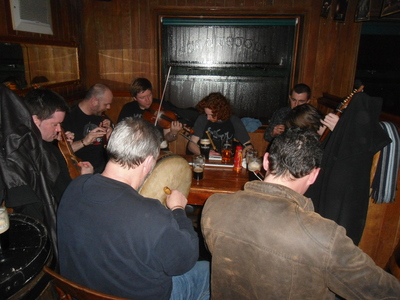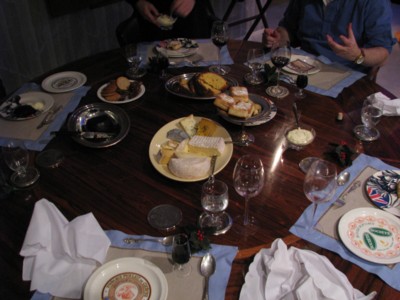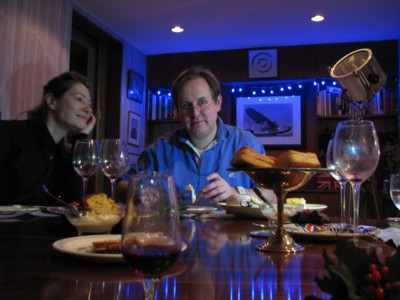We are developing the social individualist meta-context for the future. From the very serious to the extremely frivolous... lets see what is on the mind of the Samizdata people.
Samizdata, derived from Samizdat /n. - a system of clandestine publication of banned literature in the USSR [Russ.,= self-publishing house]
|
Taylor Dinerman has written a piece for the Hudson Institute on what may be coming in North Korea. I am of two minds. So long as the existing leadership keep up the facade for the rest of the world, the level of palace intrigue can become Roman in its proportions with little effect on the countryside. The key for the North Korean Aristocracy is to do one of the things it does best: keep the majority of the population outside of the Imperial City in as deep of a dark as possible.
Should their infighting erupt in a way that allows rumours to spread into the countryside, however, the entire edifice is going to come crashing down in a matter of weeks if not days.
A belated and photographic thankyou for the Christmas hospitality the night before last at Chateau Samizdata, which was predictably perfect. Madam Hostess having originated from a part of the world where they do their feasting on Christmas Eve rather than the day after, this meant that the food was no mere warm-up for the real excesses to come. This was it.
Here is some of the food we enjoyed. Guy Herbert is a cheese-spotter, a fact from which we all benefited:
Although, I marginally preferred the Christmas pud. Good as the cheese was, that was even better.
Here are our hosts:
The Dear Leader is side lit by another camera, an effect I have always liked. Head-on flash is abomination, I think. But flash from the side, done either with an attachment at the end of a wire, or by some other photographer joining in, is another thing entirely. My next camera will definitely let me do this.
Because all this was on Christmas Eve, I had no trouble getting back to my home, without any expense, for the quiet and contemplative Christmas that I now so much enjoy.
Christmas, they say, is a time for families. Mine exchanged convivial phone-calls. A beloved grandmother who reached a hundred just over a year ago, has just died, peacefully, well looked after, and not before learning that she had recently acquired a new great grand-daughter. (Which means I am also a great uncle for the first time.)
Christmas, it is also decreed, is a time to accumulate unwanted things. But mine, this time around, has been a time for ejecting such stuff. My great clear-out continues. Today, Boxing Day, more boxes will be removed. (Although I did buy a few things for friends, in the form of a couple of battery-less wind-up torches.)
Has this been, I wonder, the Second Great Kindle Christmas, when, on Christmas Day itself, people discovered that they possessed new Kindle e-books that they themselves had not asked for? The point being that the First Great Kindle Christmas was the Christmas when people were first given actual Kindles on a large scale. Which happened last year, did it not? Downloading for others brings a whole new meaning to last minute Christmas shopping, doesn’t it? So when is the absolute final deadline? 11.59 pm on Christmas Day? Or is that just too late?
Christmas now, for me, in the age of instant global communication, also means the start of the Melbourne test match, which begins in England even before Christmas Day itself has even ended. This time around Australia are playing India. As an England cricket fan I can now feel very smug and indulgent about this event. This year, England began by thrashing Australia, and then proceeded to thrash India. Whoever wins this series now won’t be better than England. Long may it last. Australia are 277-6 after day one (which is a lot better than they did after day one at Melbourne this time last year). And guess what, when I first typed that, Sri Lanka, playing South Africa were … 277-6, just before the end of the first day of that game.
So, a Happy Christmas. Next, a prosperous new year? No chance. Hence the wind-up torches.
This is not good… according to the BBC there may have been 69 Patriot missiles caught in a cargo ship in Finland.
This is bad. Really, really bad.
I let Guy Herbert buy me a drink. Nobody should ever let Guy Herbert buy them a drink. I should always buy him a drink.
– Rob Fisher, to me, a year or so back, shortly after the plans for the ID card were abandoned. The fight continues, but battles have at times been won.
Also: Merry Christmas, everyone.
It may be Christmas, Cthulhumas or Whatevermas for you.. but Samizdata wishes all friends of liberty peace and prosperity over the festive season and for the coming New Year.
I get the feeling that crime fiction is where ideas go to die.
– Brian Micklethwait

Yuletide Cheer to the sound of jigs and reels well played.
Photo: copyright Dale Amon, All Rights Reserved
Wise words from David Thompson. He supplies video to prove his point, video which reminds me of the scene in Road Trip, where the snake tries to eat Tom Green.
This posting has nothing to do with France.
Not long ago, Rob Fisher asked, back at his blog, before he started writing here, whether there is a correlation between an early enthusiasm for science fiction and later being a libertarian, and if so what might be the cause of such a correlation. And I seem to recall the notion finding its way here also, although I can’t recall or find where. It may have been in a comment thread. My take is that SF embodies the idea that things could be very different. Maybe a more general version of the same idea is that SF leads to political radicalism of all kinds. There was certainly a huge enthusiasm for SF on the left before World War 2. Think only of H. G. Wells.
I recently mentioned to Michael Jennings that I too went through a big SF phase in my teens and twenties, while in the process of becoming a libertarian, and that although I subsequently stopped reading much SF, I did later become very keen on reading history. I still am. The connection between reading SF and reading history, at any rate in my mind, is that just as SF says that the world can be very different, history is all about the fact that, in the past, the world actually was very different. Things change, from era to era, from epoch to epoch. History and SF both say that very loudly. Libertarianism, and all the other isms, say that also.
As far as history is concerned, I’m thinking of things like how the sea, in the European Middle Ages, far from being any sort of defensive wall (as Shakespeare’s John of Gaunt famously describes it – and as it later became) was actually more like a motorway system, for those able to command the vehicles to make use it of. I’m thinking of how very different life was if most of the people in the place you lived in were illiterate, perhaps including you. I’m thinking of how very hard it was even to preserve the great ideas of the past, let alone accumulate new ones with any success, before the printing press was contrived. I’m thinking of what a difference swords and bows-and-arrows and gunpowder and machine guns successively made, and what a difference atom bombs and hydrogen bombs have made to our own time. I’m thinking of what a different world it was when it was very hard to send messages of any complexity (or for that matter human beings) any faster than a succession of very expensive horses could gallop.
Michael’s response was that reading lots of SF, then becoming something like a libertarian, then reading lots of history, is a fairly common intellectual biography. So rather than ramble on, let me ask commenters. Does that sequence of interests ring any bells with any of you good people?
“Open-source intelligence has always been crucial, but for most of the cold war it was neglected by western intelligence agencies,” says Calder Walton, a research associate at Cambridge University and author of the book Empire of Secrets, to be published in 2013. “That was the archetypal intelligence war: intelligence necessarily involved information that couldn’t be gained from any other source — human agents or telephone tapping.” That doesn’t mean covert intelligence was more effective, though: Daniel Moynihan, a former US senator, compared CIA reports gathered from secret sources with Soviet documents recovered after the fall of the Berlin Wall and found they significantly overestimated Soviet capabilities. But he discovered that western think tanks using publicly available material, such as the RAND Corporation, were much more accurate. US diplomat George Kennan estimated in 1997 that “95 per cent of what we need to know about foreign countries could very well be obtained by the careful and competent study of perfectly legitimate sources of information open and available to us”.
Excerpt from an article in Wired, the tech and futurism magazine, about a Swedish investment firm, Recorded Future, that is taking the use of social networks and other systems to new heights in its attempt to get a jump on the market. In the process, it sheds new light on how the intelligence-gathering process works.
Here’s another couple of paragraphs:
The 20 employees of Recorded Future aren’t foreign-policy experts. They aren’t traders either, but if you’d started using Recorded Future’s predictions to buy US stocks on January 1, 2009, you would have made an annual return of 56.69 per cent. (The S&P 500 had an annualised return of 17.22 per cent over the same period.) Between May 13 and August 5 this year, as markets behaved with vertiginous abandon, their strategy returned 10.4 per cent; in contrast, the S&P 500 lost 9.9 per cent of its value. They’re data experts: computer scientists, statisticians and experts in linguistics. And in the data, they think, lies the future.
All Recorded Future’s predictions, whatever the field, are based on publicly available information — news articles, government sites, financial reports, tweets — fed into the company’s own algorithms. The result, it claims, is a “new tool that allows you to visualise the future” — one that is changing how government intelligence agencies gather information and how giant hedge funds place bets. On its website, Recorded Future states: “We don’t grant interviews and we don’t issue press releases.” But behind closed doors, the company is developing the technology that has been described be one tech blog as an “information weapon”.
The businesses was founded by a chap called Christopher Ahlberg, a former member of Sweden’s special forces and a serious entrepreneur. In its own way, this article is just another example of how Sweden is not quite the socialist nation that it is sometimes said to be, either by its starry-eyed admirers or detractors. There is a lot of entrepreneurial zest up there in the frozen north, it seems.
Even as supplied by an unscrupulous underground market and taken blind by consumers in a variety of unsuitable ways, they really aren’t very dangerous:
According to the ONS data, in 2010 there were more helium deaths [32] than cannabis, ecstasy, mephedrone and GHB related deaths put together.
‘Helium?’ you may ask… It’s classed as a drug but no, it doesn’t do anything. But it is so hard to buy anything reliably lethal in the UK that helium is a sophisticated means of self-asphyxiation for suicide. So even those 32 cases should not be classed under malign side effect of drug-use. Death in those cases was a positive result.
A reminder of earlier dramas in London and surrounding parts this year:
A court on Wednesday sentenced a rioter who was caught on video pulling a man off his scooter during the summer riots to almost six years in jail.
The footage of Ryan Kitchenside, 18, chasing his victim before yanking him to the ground during the August riots in Croydon, appeared on video-sharing website Youtube, leading to his eventual identification.
Equally depressing is how other rioters joined in to help, as in to help Ryan Kitchenside.
It won’t end up as six years, but it will still be something. I recall reading elsewhere, somewhere, that the regular criminals are beating up rioters in prisons, because regular prisoners don’t like their own neighbourhoods being trashed either, and because regular prisoners are having to be moved around to accommodate the new arrivals.
Read the story and view the video here.
Here is the same video at YouTube, with added sound. That video looks like it was done by a human, rather than any CCTV machine. I am not YouTube savvy enough to find out who held the camera and what the story was there. Anyone?
|
Who Are We? The Samizdata people are a bunch of sinister and heavily armed globalist illuminati who seek to infect the entire world with the values of personal liberty and several property. Amongst our many crimes is a sense of humour and the intermittent use of British spelling.
We are also a varied group made up of social individualists, classical liberals, whigs, libertarians, extropians, futurists, ‘Porcupines’, Karl Popper fetishists, recovering neo-conservatives, crazed Ayn Rand worshipers, over-caffeinated Virginia Postrel devotees, witty Frédéric Bastiat wannabes, cypherpunks, minarchists, kritarchists and wild-eyed anarcho-capitalists from Britain, North America, Australia and Europe.
|






